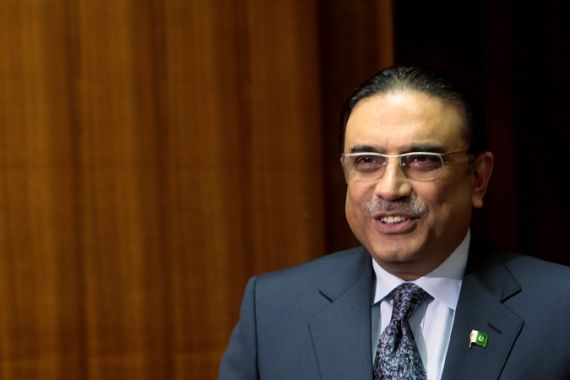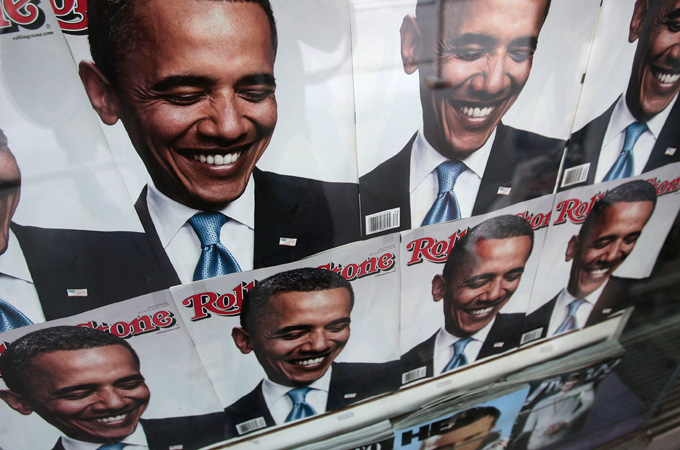Pakistan escalates its internet censorship
Censorship of political content has no place in Pakistan’s democracy, which guarantees freedom of expression.

 |
| The website for Rolling Stone magazine was banned in Pakistan after it published an article by Matt Taibbi about the Pakistani military [GALLO/GETTY] |
When websites are blocked in a country with over 20 million internet users, people tend to notice. In Pakistan, where the openness of the internet has been threatened regularly for more than half a decade, new developments are quickly noticed by the country’s online populace.
The latest incident involves the blocking, by at least 13 of the country’s ISPs, of the website of popular American music magazine Rolling Stone. The block comes shortly after the magazine published an article highlighting Pakistan’s “insane military spending”. The article, by Rolling Stone blogger Matt Taibbi, linked to a New York Times article for background information, a fact that some have used to argue that Rolling Stone may have been blocked for other reasons, such as the fact that the site hosts myriad images of scantily-clad women. But as Pakistani free expression group Bytes For All has pointed out, most major pornography websites are not censored in the country.
Keep reading
list of 4 itemsChina trying to develop world ‘built on censorship and surveillance’
Why does NASA want a time zone on the moon?
Could shipping containers be the answer to Ghana’s housing crisis?
The ban on Rolling Stone points to a possible new trend in Pakistan: censorship of politically sensitive information. While in the past, content considered blasphemous or offensive to Islam has been the target of censors both online and offline, new evidence surfaced by the OpenNet Initiative suggests increased control of the internet by Pakistan’s various information agencies. According to the report, users of popular ISP Mobilink must add proxy 10.215.2.32 port 3128 in order to browse the internet; the result is the censorship of various keywords, including – strangely – the name of the country’s president, Asif Ali Zardari.
Also blocked are various websites, including several news sites related to Balochistan, where a strong nationalist independence movement exists. According to an earlier report from the OpenNet Initiative, sites relating to Balochi independence are the “most comprehensively blocked”.
Banning blasphemy
Pakistan has also gone after social networking sites in the past for hosting blasphemous content. In 2006, the Blogspot blogging platform was blocked after the “Mohammed cartoons” in Denmark were posted across numerous Blogspot-hosted blogs. The ban lasted for more than a year.
In 2010, a high court ordered the Pakistan Telecommunication Authority (PTA) to block Facebook temporarily after users of the site hosted a “Draw Mohammed Day” contest there. Bangladesh also blocked the site, while the United Arab Emirates and Saudi Arabia blocked access to the individual page.
The latest news is that the Lahore High Court will be reviewing previous petitions filed against Facebook for blasphemous content, following the receipt of a petition calling for a permanent ban on the social networking site.
The fact that two countries were able to block only a single Facebook page – rather than the entire platform – raises the question of why Pakistan didn’t or won’t do the same. Pakistan has the sophistication and technical capability to block only a single page, rather than an entire domain.
Article 27 of the 2002 Pakistan Electronic Media Regulatory Ordinance bans distribution of any content “against the ideology of Pakistan” as well as content that is “likely to create hatred among the people”, but whether or not the ban on individual blogs or Facebook pages are justified by Pakistani law, the blocking of entire platforms caused extensive collateral damage, restricting the free flow of information in Pakistan.
Stamping out ‘smut’
Although, as previously noted, pornography remains widely available despite censorship of other types of content, a petition submitted on June 14 to Lahore High Court calls for obscene content to be blocked, arguing that “even in advanced countries, the [Internet Service Providers] have made arrangements to block all pornographic material so that children cannot access it”. The petitioner then goes on to cite Saudi Arabia – a country which pervasively blocks a variety of content, including sites providing information on minority religious groups and human rights – as an example.
The petition also argues that, “In a conservative society like ours a person can throw all caution to the wind and get full access to sexually explicit content with very little hurdles. What then? Where does this frustration vent out? Pre-marital affairs, extra marital affairs, rape, child molestation and [sic] what not!!!”
As the Association for Progressive Communications (APC) points out, the petition appeals to moral and ethical concerns but cites examples that aren’t backed up by facts. Coupled with the alarming citation of Saudi Arabia and China as effective models for internet governance, Pakistan’s approach to the internet has taken a dramatic turn unfitting of a democracy.
ISPs should not restrict content
The petition against “smut” calls for ISPs to implement filtering, something that, as previously mentioned, Mobilink appears to be doing already with other types of content. Putting responsibility in the hands of the ISPs is problematic for a number of reasons.
Internet service providers are often ill-equipped or unwilling to fight back against filtering directives. In Tunisia, where a recent petition from a group of lawyers called for the filtering of pornography, the country’s internet agency did fight back in court, though they ultimately lost. But ISPs may be unlikely to challenge such requests out of fear of appearing on the wrong side of a fight, particularly when it has been posited as a moral issue as in Pakistan’s recent case.
Relying on ISPs to restrict content also blurs the line between company and government, making it difficult for citizens to challenge a decision. And giving power to ISPs to implement technical filtering sets a precedent for the service providers to add additional sites to their blacklists in the future, without governmental oversight.
As advocates for free expression both in and outside of Pakistan have argued, the country’s latest moves online severely curtail the rights of its citizens to enjoy their right to free expression as guaranteed by the country’s constitution.
The views expressed in this article are the author’s own and do not necessarily reflect Al Jazeera’s editorial policy.
